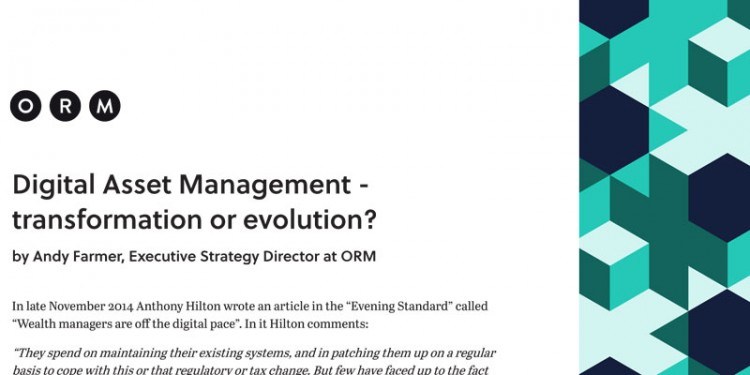In late November 2014 Anthony Hilton wrote an article in the “Evening Standard” called “Wealth managers are off the digital pace”. In it Hilton comments:
“They spend on maintaining their existing systems, and in patching them up on a regular basis to cope with this or that regulatory or tax change. But few have faced up to the fact that the future is digital, let alone put in place a coherent strategy to embrace it”.
I would argue that 18 months on, and this opinion is still not far off the mark, but why?

New forms of digital peer-to-peer lending like Funding Circle or social investing like eToro are nibbling away at the edges of the funds managed by traditional wealth managers. Digital adviser platforms like Nutmeg are resonating with younger private investors, even if they are yet to turn advocacy into profit.
And I think this is the point. For many asset and wealth managers the mass affluent customer is still seen as an irrelevance. Usually, most of the wealth they make is through institutional investors and influential intermediaries. With such a small, well-known audience, why do they need digital communications and client servicing, when they can just as easily pick up the phone or meet face to face?
But this is to ignore a couple of universal truths: according to PWC by 2020 over half of the investable assets in the UK will be held by “millenials”, (those entering adulthood around or a few years after 2000). They have grown up with digital communication and social media. As individuals in the FS industry they have probably already served their apprenticeship as executives, researchers and paraplanners and are on their way to becoming increasingly influential institutional consultants, and discretionary fund managers – by reputation and volume.
The expectation of these individuals will be “digital first”. That does not preclude personal selling, relationship management, or events – but organisations that can’t back this up with digital communications that anticipate their needs, and digital client servicing that maximises the “up-time” in their busy schedules, are less likely to succeed.

I think the initial mass-market focus of “digital transformation” in the past 5 years has perhaps muddied the waters and perhaps blinded the industry to the real benefits digital can deliver it:
- Maximising the efficiency and effectiveness of its talented relationship managers and subject matter experts, by digitising the outmoded operational processes that reduce their time and ability to sell face to face. Allowing them to be swifter, more anticipating and responsive so all conversations are value-add rather than administrative.
- Cementing those personal relationships with better, swifter, more targeted, bite-sized insights served through digital.
- The ability to deliver these insights through digital’s ability to capturing personal needs and preferences through online behavioural analysis and single customer views
This is the journey we are on with some of our clients currently – sometimes in quite a phased, lightweight, but always effective way, based upon driving ROI for their businesses. It may include using digital technology to deliver preference centres for adviser and institutional clients, marketing automation programmes, content personalisation strategies or needs-based fund centres and portfolio planners.
But in every case it’s about using digital to fulfil our partners’ business needs, by reducing the pain points of their clients and in every case its underpinned by a sound strategy and robust business case.
In conclusion, the opening premise of Hilton’s article in November 2014 was that UK was very good at wealth management, but that we weren’t making the most of those skills. In the same column in March 2016 he pointed out that in the two years after the Olympics Silicon Roundabout (Old Street EC1V), we have seen the creation of 32,000 businesses and more jobs than the financial sector had lost during that time.
Isn’t then, the time now right for asset and wealth managers to make the most of one of the other things London and the UK is very good at- Digital technology.
To view this article in PDF format, please click download using the button above.

